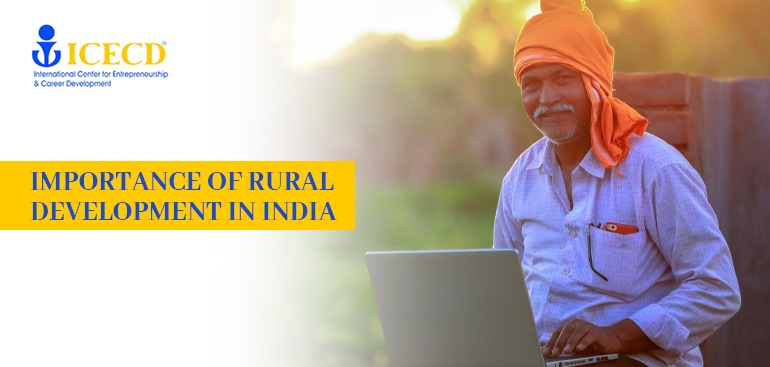The importance of rural development lies in its ability to enhance the quality of life and promote the economic well-being of people living in rural areas. However, the major source of rural income depends upon agricultural output and labour engagement.
Since, 88.84% of Indian population lives in villages according to the census of 2011, development of the nation and reaching the goal of $5 trillion economy depends upon development of rural India but on the contrary 1/3rd of the rural India is still living below the poverty line which has become the biggest impediment to the all-round development of the economy.
Rural India is the backbone of Indian economy. Rural development is not merely development of rural areas, but rather it involves human development of varied nature including a well development of mental caliber of the rural people so as to transform India into Aatmnirbhar Bharat with the modern facilities available to any developed community. Therefore, the initiative of transformation of rural India into ‘urban’ on the sustainable and equitable model would play a vital role in development of Indian economy.
Rural development is pivotal to India’s holistic growth, as a significant portion of the population resides in rural areas. Enhancing the quality of life and economic well-being of these communities is essential for national progress. Recognizing this, the International Centre for Entrepreneurship and Career Development (ICECD) offers a Certificate course in Rural Development Management (RDM), designed to equip individuals with the skills necessary to drive sustainable change in rural India.
What is Rural Development?
Rural development is the process of improving the quality of life and economic well-being of people living in relatively isolated and sparsely populated areas. It involves developing infrastructure (roads, electricity, water supply), enhancing access to education and healthcare, creating employment opportunities, and promoting sustainable agriculture and livelihood practices.
In short, it is about creating equitable growth in rural regions so that they are not left behind in the nation’s progress.
Objectives of Rural Development
1. Improving Quality of Life in Rural Areas
- Ensure access to basic amenities like housing, clean drinking water, sanitation, healthcare, and education.
- Enhance nutrition and overall well-being.
2. Generating Employment and Livelihood Opportunities
- Promote self-employment through skill development, micro-enterprises, and self-help groups (SHGs).
3. Reducing Poverty and Economic Disparity
- Uplift economically weaker sections by promoting income-generating activities and financial inclusion.
- Provide subsidies, financial support, and access to credit.
4. Developing Rural Infrastructure
- Improve roads, transport, communication, irrigation, electrification, and internet connectivity.
- Ensure better access to markets for rural produce.
5. Empowering Women and Marginalized Communities
- Encourage participation of women, SCs, STs, and minorities in development initiatives.
- Provide capacity-building and leadership training.
6. Promoting Sustainable Agricultural Practices
- Enhance productivity, irrigation facilities, and adoption of eco-friendly technologies.
- Encourage crop diversification and organic farming.
7. Encouraging Community Participation
- Strengthen local governance through Panchayati Raj Institutions (PRIs).
- Foster ownership and accountability within communities.
8. Ensuring Environmental Sustainability
- Focus on afforestation, watershed development, renewable energy, and conservation of natural resources.
ICECD’s Certificate Course in Rural Development Management (CRDM)
ICECD‘s 3-months CRDM program is meticulously crafted to provide comprehensive knowledge and practical skills in planning, implementing, and monitoring rural development projects. The curriculum covers various aspects, including:
- Sociology and Socio-economic development strategies
- Social Development Management
- Human Resource Management
- Environment Management
- Development Management
- Non-profit and CSR project management
Why Choose ICECD’s CRDM Program?
- Expert Faculty: Learn from professionals with extensive experience in rural development and social entrepreneurship.
- Career Opportunities: Graduates are well-equipped for careers in various sectors focused on rural development and social impact.
- Self paced learning: The programme is designed in such a way that students can pace their learning easily throughout the week at their convenient time. This would be ideally suited to working people and students
Who Can Join?
- Any person already working or interested in working as Development Resource Person, Trainer, Facilitator; Decision Maker with NGOs, Government Departments or the CSR department of Corporate.
- Any person working as or wanting to work as a professional in the field of development sector (socio economic environment).
- Developmental Organisations (GOs, NGOs or Corporate Sector) may sponsor their candidates to do this course.
Conclusion
Investing in rural development is investing in India’s future. ICECD’s Certificate course in Rural Development Management empowers individuals to become catalysts for change, addressing the unique challenges of rural communities and contributing to the nation’s inclusive growth.
If you’re passionate about creating sustainable change in rural India and wish to build a meaningful career in development, enroll in ICECD’s Certificate in Rural Development (CRDM) today.
Also read:
Sustainability Courses in India: A Pathway to Socio-Economic and Environmental Change


